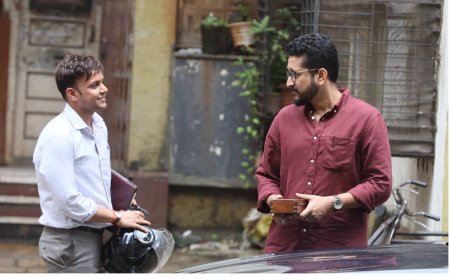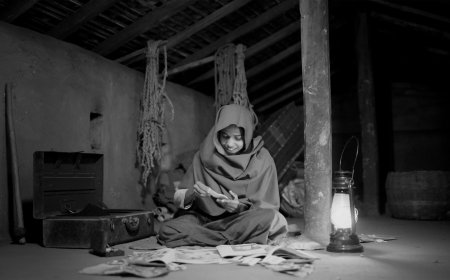Interview: Ragu Aarav

Ragu Aarav’s short film Shackles of Sky tells the story of a married couple, Neela and Shanmuka, who are in the throes of a crisis. Neela wants to conceive a child, but Shanmuka is not yet prepared to take on the responsibility. It creates a conflict in their lives and their relationship becomes strained. As a debutant, Aarav has treated the subject of his film with conviction and relentless observation. While portraying the plight of his characters, he gently draws our attention to a social issue and how it affects their lives.
In this interview, Aarav discusses his decision to become a filmmaker, the role of patriarchy in our society, and his perception of society.
How did your graphic designer experience help you make your first short film?
As a graphic designer, I love the art of telling a story through a single static image—or a series of images—without relying on motion. It is a far more challenging job, than working making a trailer or film. This process has sharpened my visual instincts and strengthened my ability to conceptualise imagery. It deepened my understanding of the power of visuals in storytelling.
Moreover, I’ve always aspired to create my own posters for the films I make, blending my two passions seamlessly. Collaborating with various filmmakers as a designer has only heightened my perspective. It allowed me to perceive stories through diverse lenses. Thus, my background in graphic design has not only shaped my creative identity but also helped me as a visual storyteller.
What was your inspiration behind the short film?
Throughout my life, I’ve observed the strong grip of patriarchy within my family and the families around me. As a man, I’ve come to realise that I, too, have unconsciously carried these patriarchal values. In Shackles of Sky, the issue isn’t just about having children—it’s about having a voice, an opinion, as an individual. Neela represents the countless women denied the freedom to express their choices or make decisions. Through her journey, I wanted to highlight that a family isn’t solely built on the husband’s decisions; it is complete only when the wife’s opinions and agency are equally valued. This is the main point I wish to convey with Neela’s story, and it’s the standpoint from which I approached this film.
From the argument between Shanmuka and one of his colleagues, it becomes evident that he had his wife have abortions numerous times. Is this due to financial difficulties or fear of responsibility?
Humans are not purely black or white. They are, by nature shades of gray. So, I wanted to clarify Shanmuka's take on the matter and wanted the audience to be aware of his thoughts about past abortions. Also, I wished to show candid conversations among men, where they often disregard their female partner's opinions reflection of a larger societal issue. For Shanmuka, his financial constraint plays a huge role in what he chooses to do. I did not go there much about that because I wanted the audience to sort of interpret for themselves how he deals with his situations.
When Shanmuka is informed about his wife’s pregnancy, we do not hear what happens behind the glass cabinet. Why is it so?
Before the scene in the office, Neela speaks to Giriyamma on the balcony and reveals her fear of Shanmuka coming to know about her pregnancy. So, in the cabin scene, I purposely did not repeat the same information about Neela's fear. I wanted to create this curiosity in a manner that was not communicated by a clear-cut conversation. Thus, I decided to leave to the imagination of the audience all the details of their encounter within the cabin. It sparked mystery and tension.
The film ends with a brave revelation by Neela, but we don’t see Shanmuka’s reaction. (Spoiler Alert!)
There were two main reasons behind it. First, Shanmuka's reaction had to be imagined by the audience and fill in the blanks according to their perspectives. Second, the story of the film is that she finds her courage and breaks above her scares. She is braver and up in arms in a sense by the end. So, I ended the film with a shot of her face.
How was your experience at the Dharamshala International Film Festival 2024?
I have always wished to be a part of Dharamshala International Film Festival, either as a filmmaker or viewer. So when my first short film was screened there, it was a very special, memorable experience. The festival and its energy were truly amazing-beautifully vibrant, passionate crowds, and the stunning environment created by McLeod Ganj will leave an indelible mark on my life for four fantastic days. Witnessing some of the most fantastic films and bonding with other artists was very inspiring and refreshing.
I am immensely grateful to the festival committee for the immense love and support and for creating such a warm ambience for storytellers and cinephiles. It was a truly magical place to be, and I’ll cherish this experience forever.
What's Your Reaction?


































































